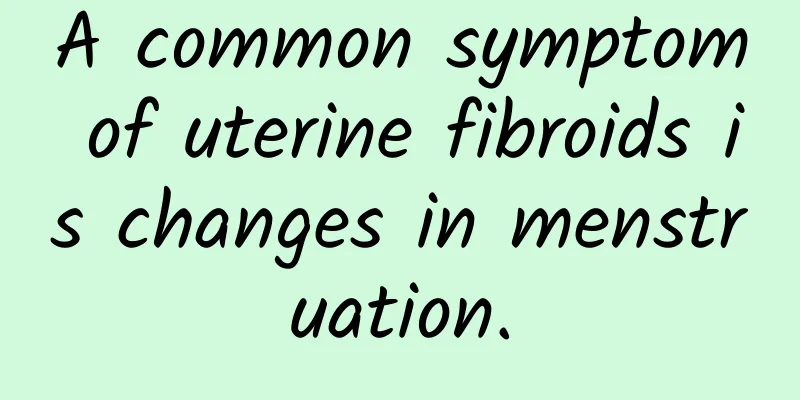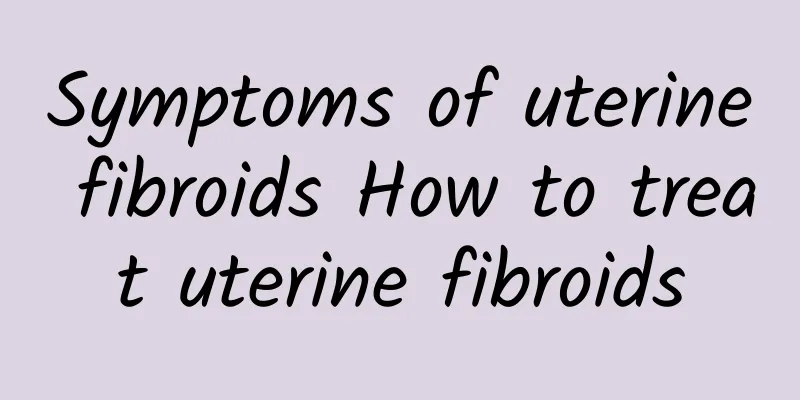A common symptom of uterine fibroids is changes in menstruation.

|
The probability of uterine fibroids occurring in women is very high. Many women worry about whether they will have symptoms of uterine fibroids . So what are the symptoms of uterine fibroids? Let us learn about the symptoms of uterine fibroids in detail from the article below. 1. Menstrual changes: This is the most common symptom of uterine fibroids, manifested as shortened menstrual cycle, increased menstrual flow, prolonged menstrual period, irregular vaginal bleeding, etc. 2. Abdominal mass: The abdomen is swollen, and a mass can be felt in the lower abdomen, accompanied by a feeling of falling. 3. Increased leucorrhea: Increased leucorrhea, sometimes with a large amount of purulent and bloody discharge and necrotic tissue discharge with a foul odor. 4. Pain: Generally, there is no abdominal pain in the symptoms of uterine fibroids, but there are often lower abdominal distension, back pain, etc. When the subserosal fibroid pedicle is twisted, acute abdominal pain may occur. When the fibroid turns red, the abdominal pain is severe and accompanied by fever. It can usually be relieved with the Chinese medicine Shijie Gao. 5. Compression symptoms: When the fibroids grow forward or backward, they can compress the bladder, urethra or rectum, causing frequent urination, dysuria, urinary retention or constipation. When the fibroids grow to both sides, they form broad ligament fibroids, which can compress the ureter and cause hydroureteral or renal pelvis; if they compress the pelvic blood vessels and lymphatic vessels, they can cause lower limb edema. 6. Infertility: Fibroids compress the fallopian tubes, causing them to twist, or deform the uterine cavity, thus preventing the fertilized egg from implanting and leading to infertility. 7. Secondary anemia: If the patient has excessive menstruation for a long time, it may lead to secondary anemia. General fatigue, pale complexion, shortness of breath, palpitations, etc. are all symptoms of uterine fibroids. 8. Hypoglycemia: Hypoglycemia associated with uterine fibroids is also rare. The main symptoms are low fasting blood sugar, loss of consciousness and even shock. The symptoms can completely disappear after glucose injection. The symptoms of hypoglycemia will completely disappear after tumor resection. The above information is about the symptoms of uterine fibroids. After the expert’s analysis of the symptoms of uterine fibroids, you should understand it better. If you still don’t understand the symptoms of uterine fibroids, please consult our online experts, they can help you. |
<<: Introduction to the causes of adnexitis that everyone needs to understand
>>: Uterine fibroids can lead to infection, suppuration, infertility or miscarriage
Recommend
How women can prevent premature menopause
The purpose of analyzing the methods of preventin...
At what age do uterine fibroids usually occur? At what age do uterine fibroids usually occur?
At what age do uterine fibroids usually occur? At...
What medicine can be added to mugwort to treat vulvar leukoplakia? What diseases can mugwort treat?
In recent years, with the increasing interest and...
Briefly summarize several methods of treating vaginitis
At present, the incidence of vaginitis is increas...
When should adults get the flu shot?
The best time for adults to get the flu shot is u...
Experts explain what are the main causes of cervical hypertrophy
Cervical hypertrophy is a common gynecological di...
Is there any harm in having a hysterectomy for adenomyosis?
Removing the uterus may have some physical effect...
Is it necessary to treat menopause?
When women reach menopause, they will naturally e...
Fruit calorie bomb! 1 mango = 1 bowl of rice
It is the sunny summer and the mango season has a...
What to do about irregular menstruation caused by blood deficiency? 6 dietary care methods for irregular menstruation
Many women around me are infertile due to blood d...
10 taboo foods for uterine fibroids
Uterine fibroids are common benign tumors in wome...
Experts explain the dangers of several serious pelvic inflammatory diseases
Pelvic inflammatory disease is a gynecological di...
Let's take a look at the methods for diagnosing cervical hypertrophy
Women need to pay attention to the disease of cer...
The hazards of cervical erosion, patients with cervical erosion may face 4 dangers
Many women often need to take various Chinese med...
Roll up the rich nutrition! 10-minute homemade cabbage rice rolls look better and taste better
Cabbage is highly accepted by both adults and chi...









